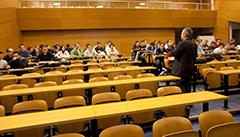
Sciences & Société
Soutenance de thèse : Maxime MONZEY
Experimental and numerical study of carbon electromigration in iron during ferrite-austenite phase transformation
Doctorant : Maxime MONZEY
Laboratoire INSA : Mateis
Ecole doctorale : ED34 : Matériaux de Lyon
Joule heating is widely used during the different thermal treatments and material forming processes in metallurgy. Until recently, thermal treatments assisted by electric current were considered equivalent to conventional heating methods. However, the evolution of the microstructure in presence of electric current is still not well understood.
The aim of this thesis was to determine the impact of an electric current on the diffusion of carbon in iron and on the ferrite-to-austenite phase transformation. To study these phenomena, solid carburization of high-purity iron samples (ARMCO) is performed during thermal treatments in the intercritical domain. Samples are heated thanks to Joule effect induced by direct continuous or pulsed electric current.
A model of carbon diffusion which accounts for both the phase transformation and the electromigration of carbon in iron has been proposed. The sensitivity study on the model parameters showed that the phase transformation kinetics mainly depends on the diffusion coefficient of carbon in austenite. In addition, the effective charge of carbon in austenite can be adjusted to model the electromigration of carbon. Thus, these two parameters were determined based on a comparison between experimental data and simulations.
Phase transformation kinetics were found faster in the direction of the electric current and hindered in the opposite. A 30% higher current density resulted in a diffusion coefficient 50% higher. The effective charge was found to be between +12 and +36, depending on the experimental conditions.
All these results are discussed in the light of the physical phenomena reported in the literature. In particular, they question the studies of the effective charge that do not consider the influence of current on the diffusion coefficient. This PhD-work also provides new values for the effective charge of carbon in the intercritical domain.
Informations complémentaires
-
Amphithéâtre Freyssinet (Villeurbanne)(Villeurbanne)

